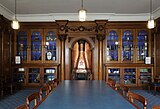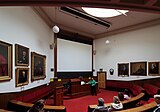Liverpool Medical Institution
| Liverpool Medical Institution | |
|---|---|
 Liverpool Medical Institution | |
| Location | Mount Pleasant and Hope Street, Liverpool, Merseyside, England |
| Coordinates | 53°24′12″N 2°58′09″W / 53.4033°N 2.9692°W |
| OS grid reference | SJ 357 900 |
| Built | 1837 |
| Built for | Liverpool Medical Institution |
| Architect | Clark Rampling |
| Architectural style(s) | Greek Revival |
Listed Building – Grade II* | |
| Designated | 28 June 1952 |
| Reference no. | 1208429 |
The Liverpool Medical Institution is a historic medical organisation based in Liverpool, United Kingdom. Its building on the corner of Mount Pleasant and Hope Street was opened in 1837, but the site has been used as a medical library since 1779.[1]
History
[edit]The building is on the site of a former inn and a bowling green, which was the birthplace of the businessman and amateur scientist William Roscoe. In 1779 a group of local doctors created the Liverpool Medical Library.[2][3] In 1833 the Liverpool Medical Society was formed. The two societies merged as the Liverpool Medical Institution, and commissioned Clark Rampling to design a building to house it. The building cost £4,000 (equivalent to £480,000 in 2023),[4] and was opened in 1837.[3] In 1907 the Council Room was remodelled by Edmund Rathbone.[5] The society was incorporated under a Royal Charter in 1964.[6] An extension was added to the building in 1966.[5] In 1998 a major refurbishment of the building took place.[2]
The Liverpool Medical Institution is recorded in the National Heritage List for England as a designated Grade II* listed building.[7]
Architecture
[edit]The building is constructed in stone, and presents a curved façade to Mount Pleasant and Hope Street. Its architectural style is Greek Revival. It has 16 bays. The lateral three bays on each side are recessed and have two storeys; the rest of the building is single-storied. The central seven bays form a recessed entrance behind six unfluted Ionic columns. Elsewhere the bays are divided by pilasters. The windows are sash windows. Along the top of the building is a cornice.[7] Inside is a central hall, a lecture theatre, a library, a museum, and meeting rooms, all lit from above by glazed domes.[3]
Present day
[edit]The Institution "exists to foster an environment for furthering medical and health education and knowledge".[8] It organises lectures and social events,[9] runs a library,[10] and hosts meetings of the Liverpool Medical History Society, which was founded in 1984.[11] It is a registered charity,[6][12] and hosts the Mersey branches of the Royal College of Physicians and Royal College of General Practitioners of Great Britain.[13][14] The Institution also contains an historic library, available to members and researchers, which includes an archive of rare medical books and manuscripts from the 16th century.[15]
A portrait of Dr Richard Caton hangs in the Institution, who founded the forerunner to the Liverpool Medical Students Society, known as The Liverpool Royal Infirmary School of Medicine Debating Society (M.S.D.S.) in 1874.
-
Modern Extension of Liverpool Medical Institution, shown from Mount Pleasant, Liverpool
-
William Roscoe (1753-1831) born at the Bowling Green public house on the site now occupied by the Liverpool Medical Institution
-
Henry Cohen, 1st Baron Cohen of Birkenhead, president of the Liverpool Medical Institution for the year 1954.
-
Frances Ivens, first female vice-president of the Liverpool Medical Institution, 1926.
-
The Institution's library
-
The Council Room
-
The Lecture Theatre
See also
[edit]- Architecture of Liverpool
- Healthcare in Liverpool
- Liverpool Medical Students Society
- University of Liverpool School of Medicine
References
[edit]- ^ Bickerton, T.H. (1936). A Medical History of Liverpool from the Earliest Days to the Year 1920. London: J. Murray.
- ^ a b Welcome, Liverpool Medical Institution, retrieved 7 August 2011
- ^ a b c Pye, Ken (2011), Discover Liverpool, Liverpool: Trinity Mirror Media, p. 32, ISBN 978-1-906802-90-5
- ^ United Kingdom Gross Domestic Product deflator figures follow the MeasuringWorth "consistent series" supplied in Thomas, Ryland; Williamson, Samuel H. (2024), "What Was the U.K. GDP Then?", MeasuringWorth, retrieved 15 July 2024
- ^ a b Pollard, Richard; Pevsner, Nikolaus (2006), Lancashire: Liverpool and the South-West, The Buildings of England, New Haven and London: Yale University Press, p. 378, ISBN 0-300-10910-5
- ^ a b Liverpool Medical Institution, Charity Commission, retrieved 7 August 2011
- ^ a b Historic England, "Liverpool Medical Institution (1208429)", National Heritage List for England, retrieved 22 June 2012
- ^ Membership, Liverpool Medical Institution, retrieved 7 August 2011
- ^ Diary of lectures & social events, Liverpool Medical Institution, retrieved 7 August 2011
- ^ The Library, Liverpool Medical Institution, retrieved 7 August 2011
- ^ Liverpool Medical History Society, Liverpool Medical Institution, retrieved 7 August 2011
- ^ Disclaimer & site information, Liverpool Medical Institution, retrieved 7 August 2011
- ^ "RCGP | Mersey Faculty", www.rcgp.org.uk, retrieved 8 February 2017
- ^ "Mersey", RCP London, 10 October 2015, retrieved 8 February 2017
- ^ "Library and Archives, Liverpool Medical Institution", www.lmi.org.uk, retrieved 11 November 2016
External links
[edit]- Educational institutions established in 1779
- 1779 establishments in England
- Buildings and structures completed in 1837
- Grade II* listed buildings in Liverpool
- Education in Liverpool
- Medical and health organisations based in Merseyside
- Medical research institutes in the United Kingdom
- Medical schools in England
- Organisations based in England with royal patronage
- Greek Revival architecture in the United Kingdom
- Medical museums in England








